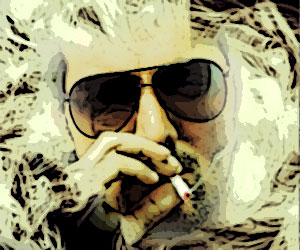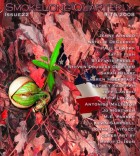Great title. What do you make of it? What drew you to the idea of innocence, briefly?
Thank you. Often I struggle with titles, but this one came to me intuitively and really informed the story. The two sets of twins here began evolving at roughly the same time but in two separate venues. Apart from the fact that they both featured twin protagonists, the stories were quite different from each other. At some point my gut gave me the title and told me to scrap the drafts I had and put the twins together. I realized that both sets of characters were coming at slightly different ideas of innocence, only from opposite sides of the coin, and that the meaning I was looking for would only come in making these opposing characters share the same space. In a nerdy intellectual sort of way, it was an exciting prospect to raze the stories and build something new from the rubble. It made it feel as if the creation process also reflected the theme I was examining.
Faith. Jessup. Azrael. Sariel. Alvin & the Chimpunks. Victor of Aveyron. Mimsy. Agnes. Dot. What, Jenny, is in a name?
A rose by any other name might smell as sweet, but give your wife rose-scented carnations on Valentine’s Day and see what happens. A name, I think, is a powerful thing. Whether it points to type or carries a backstory or has no meaning at all, it’s a choice to be made. Especially in flash fiction, where careful word choice sometimes carries a more immediate need, I think names are important. This isn’t to say that all of my names carry extra meaning, but for me it’s important to distinguish when I think they should, when I think they shouldn’t, and when I think it doesn’t matter one way or the other.
“Plenty of time,” she calls at the end. The ending invokes the “briefly” of the title. What are you trying to do with an ending? What do you think this ending accomplishes?
It can be hard, I think, to listen to a story to find where it wants to end. An ending, of course, implies closure, but I think it’s also important for endings to open up a story in some sort of way. This is a fine line to walk. With an ending, I try to make both myself and the reader go back to think about what we’ve just read (though not in that twist ending kind of way where, if you do go back, it’s just to find the misleading words or ideas that set you up for the surprise). I hope this ending accomplishes that, and while it invokes the “briefly” of the title, it also invites thought about the idea of innocence.
“It’s just a story,” Jessup says, “just a story.” What of stories? What truth might one find there? What lies?
That’s an interesting question. Was it Mark Twain who said the difference between fiction and non-fiction is that fiction must be believable? Along these same lines, I often find myself drawn to stories with surrealist or magical realist elements because I think sometimes the best way to discover what is true is to forgo what is real. One might find plenty of truths in stories, as well as plenty of lies, and sometimes they might come wrapped together in the same packages.
Begin this answer with the words, “I write.” Complete the sentence. Then, write as many sentences as you’d like, each one beginning with that “I write….”
I write fiction. I write more personal truths into that fiction than I sometimes care to think about. I write too slowly for my own comfort, especially since when I talk, you can’t shut me up. I write stories that make my mother uncomfortable, but more and more, the pride is taking over.



 The SmokeLong Grand Micro Contest (The Mikey) is now an annual competition celebrating and compensating the best micro fiction and nonfiction online.
The SmokeLong Grand Micro Contest (The Mikey) is now an annual competition celebrating and compensating the best micro fiction and nonfiction online.